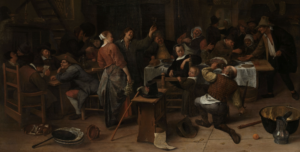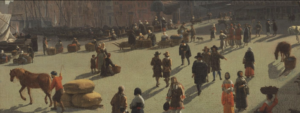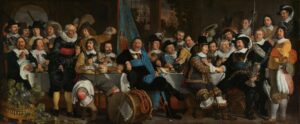Date/Time
Date(s) - 04/11/2021
4:00 pm - 5:30 pm
Location
BG1
Categories
We are pleased to welcome you to our upcoming CREATE Salon on Amsterdam related historical research.
Date: Thursday, 4th of November, 2021
Time: 16:00 – 17:30
Location: 0.04, Mediastudies, BG1 Turfdraagsterpad 9, 1012 XT Amsterdam
Followed by drinks at Kapitein Zeppos!
This shall be a hybrid event.
To attend virtually: Please join via the zoom link.
If you are joining in person: please register via this link.
This salon will comprise of three presentations followed by discussions:
 Integration and Social Mobility: The Descendants of Early Modern Immigrants in Amsterdam
Integration and Social Mobility: The Descendants of Early Modern Immigrants in Amsterdam
Jessica den Oudsten
Jessica’s PhD project addresses one of the major questions in Dutch migration history: what happened to the descendants of the hundreds of thousands of Germans, Flemish and Scandinavians who migrated to the Dutch Republic in the early modern period? During the early modern period, immigrants constituted a large segment of the urban population—in Amsterdam around 1650 circa 40% of the resident population were born abroad. This project zooms in on Amsterdam between 1660 and 1811 and focuses on how the descendants of early modern immigrants integrated in Dutch society, and what were their chances of having a better life than their parents?
Entity Matching in Digital Humanities Knowledge Graphs
Juriaan Baas
The Golden Agents project is developing a sustainable research infrastructure to study relations and interactions between producers and consumers of creative goods during the Dutch Golden Age. This requires integration of various heterogenous datasets by finding links between entities that represent the same real-life objects, sometimes called entity matching. For this purpose, Juriaan and his team have developed a method that considers the “neighbourhood” of certain entities and based on their (partial) overlap assigns these entities a coordinate, where entities with strong overlapping neighbourhoods have similar coordinates. Based on these coordinates, they create a set of (singleton) clusters where each cluster represents a single real-life object.
 Urban Life on the Move. Gender and Mobility in Early Modern Amsterdam
Urban Life on the Move. Gender and Mobility in Early Modern Amsterdam
Bob Pierik
Bob will speak about his forthcoming dissertation. Through a database of everyday practices (designed together with us: CREATE), he has been able to analyse the movements of men and women through Amsterdam in the eighteenth century. These gendered mobilities of everyday life give insight into people’s rhythms and routine throughout the city. This research is part of the project: Freedom of the Streets.

